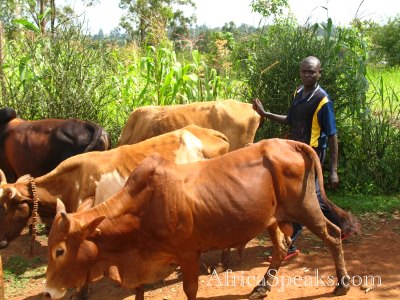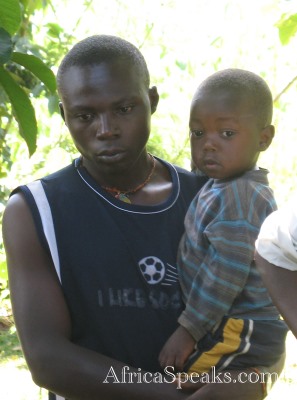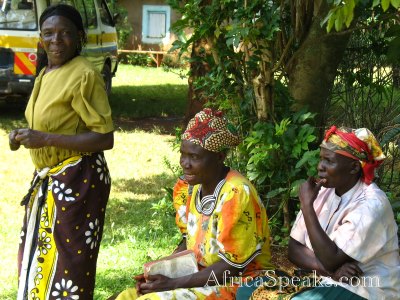The original URL of this article is:
www.africaspeaks.com/kenya/30082006.html
The Role of Christianity in Kenya
by Ras Tyehimba
August 30, 2006
UWI Students Trip to Kenya
 | | | Ras Tyehimba | |
We stayed mostly in a rural area in which agriculture plays a central role in the lives of the people there. The village of Shikunga is a curious mix of traditional mud houses and more modern concrete houses. Many houses have no electricity. Fields of corn and millet are everywhere, being very popular in the diet of Kenyans. People also plant and sell cassava, sugarcane, beans and cabbage and rear various livestock including cattle and chickens. Other means of generating income that I observed in the rural areas include collecting firewood from the forest and selling it in the market, trading agricultural products and working in the tea and horticultural industries.
The traditional values and languages of Kenyan people seem to be most present in the rural areas. Interacting with ordinary people in the villages, they were warm, hospitable, hardworking and dignified. Learning about their realities and way of life and sharing aspects of the Caribbean with them made the experience memorable.
 | | Looking after cattle |
Though many of the peoples have been converted to Christianity in the process of colonization, their way of life is a mix of Christian beliefs and behavior and traditional beliefs and behavior. In a similar manner to Trinidad, Kenya is very Christianized. One orphanage we visited that is operated by a Seven Day Adventist emphasized the nature and colonizing role of Christianity in Kenya. We toured the school, visiting an adult education bible study class; there was a short assembly where the children sang a couple of songs including: 'Don't leave me, Jesus'. The orphanage office wall had numerous images of the typical white, blonde-haired Jesus, with one such image having the words, "I am the light of the World," underneath it. Some may argue that such images and indoctrination are inconsequential, but in Trinidad and Tobago (and in the wider Caribbean) and Africa there exists a clear relationship between the Christianization of the people and the breakdown of their resistance against the forces of Western imperialism. Conversion to Christianity has tended to pacify Indigenous peoples, making them more accepting of abuse, foreign control and the theft of their resources by imperialist powers.
There is no way that a Black person can have a healthy concepts of him/herself while having a white, blonde image as one's divine savior and/or from having the colonially-imposed Christian bible as the book from which one's world view is primarily shaped. From this conditioning there is a strong preference for foreign values, ideals, products and authorities.
However, it is important to understand the context in which many people in colonized regions were converted to Christianity. The missionaries were an important mechanism in European powers extending their control and imperial influence throughout the world from the 1500's up to present. In the case of many parts of Africa, Arab and European intrusion disrupted the traditional culture and social structures of indigenous people, which had sustained African peoples for thousands and thousands of years. A similar scenario also played out in the New World after Columbus sailed into the region and came upon the indigenous people and their lands. In conjunction with the colonial administration, Christian organisations often controlled a lot of resources including prime land, access to food, health care and the formal education system, which were instrumental in their attempts to convert the indigenous population to Christianity. In Kenya, most of the schools that we visited were either constructed and run by religious institutions or had some association with mainstream religions. Thus Africans converted to Christianity as a survival mechanism, but in doing so, adapted, to various extents, Christianity theology to suit their situation. In response to the lack of learning materials around, the bible would be interpreted in a manner more in line with liberation.
 | | | Father and Son | |
The cultural practices differ according to the 42 different tribal peoples that make up Kenya's population. Though most are Christians of some sort, traditional practices such as circumcision and polygamy are practiced by many tribes. Especially for males, circumcision is an important aspect of the rites of passage that take Kenyan males from boyhood to manhood. As for polygamy, in Shikunga village, we visited the worksite of a traditional blacksmith who was working on making several tools in his furnace. We were introduced to his two wives who were working together, preparing porridge.
While speaking to an elder, he outlined to me some of his concerns with the direction society was going. He spoke of the hardships of the lack of material resources as well as the limited access to opportunities. He spoke of the increased Westernization of the Kenyan people brought about the mainstream version of Christianity and the rapid changes going in communities by people moving out of the rural areas to the town and city areas seeking employment and new opportunities. The forces of Westernization are most present in the city areas, being apparent in terms of the modes of dress, the language (English) that is most emphasized and the general orientation of the people.
The pockets of resistance in Kenya to the dominant forces of Westernization are important to note. I bought a book in a Kenyan bookstore by Ngugi wa Thiong'o titled, 'The River Between'. He was first known as James Ngugi, but subsequently renounced Christianity, English and the name 'James' as colonialist and thus began to write in Swahili and his native language Giguyu. His most popular books include 'A Grain of Wheat' and 'Decolonizing the Mind: The Politics of Language in African Literature'. The latter book argues that African writers should write in their native languages rather than the Imperial languages (English, French, and Portuguese) that most writers write in, which were recently imposed. For Ngugi, an educational focus that is primarily rooted in linguistically and culturally foreign works are detrimental to a people: "Thus language and literature were taking us further and further from ourselves to other selves, from our world to other worlds." Ngugi argues that there are, "two mutually opposed forces in Africa today: an imperialist tradition on one hand, and a resistance tradition on the other."
 | | Women of Shikunga Village |
Many of the above issues are very relevant to Trinidad and Tobago and the wider Caribbean. The role of Christianity in Trinidad can be said to be closely aligned with the imperialist tradition. Local leaders, including the local elite, have acted in a manner that has further entrenched the dominance of foreign attitudes, ideals and interests, all to the detriment of Trinidadians and Tobagonians forging an indigenous developmental path based on our experiences and interests. As Ngugi noted, this preference has disconnected us from ourselves, it has disconnected people from their history and the potential lessons thereof. Why do our leaders run to Americans and Canadians when they want to improve the formal education system? Why do our leaders run to so-called authorities abroad, such as former New York mayor Rudy Giuliani, Professor Stephen Mastrofski and Scotland Yard for solutions to local problems? It is ironic that the reliance on foreign sources for solutions (that they can't provide anyways) to national problems is part of the cause of our problems in the first place. An informed population would be less accepting of such foolish movements on the parts of their leaders.
UWI Students Trip to Kenya in pictures:
http://rastafarispeaks.com/gallery/Trip_to_Africa_2006
|
|